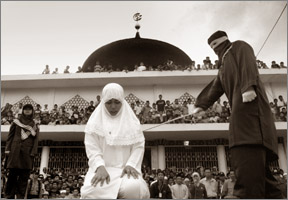Islam's pioneering women priests
A radical innovation in the Islamic world has arisen in Morocco -
women priests. The Mourchidat, as they are known, are the first women
ever in any Muslim country that can perform the functions of a male Imam
in a mosque, except lead the prayers.
|

A Shariah law officer canes a woman who violated strict laws
forbidding contact between unmarried men and women in front of a
mosque in Banda Aceh, Indonesia, Friday, Jan. 27, 2005. This woman
is blamed for staying together with her boyfriend in a house in
Banda Aceh. Though most of its 190 million Muslims practise a
tolerant form of the faith, a small but determined group of
conservatives want the sprawling archipelago to look more like
orthodox countries in the Middle East have been gaining ground. -AP |
Fifty Mourchidat have graduated and have now begun their ministries.
However, not everyone agrees with the new appointments.
The Mourchidat will be allowed to lead religious discussions and give
advice in their communities - particularly to women. The only thing they
will not be able to do is to lead prayers. That role will still be
reserved for male Imams. In the courtyard of Rabat's biggest mosque -
the Sunna mosque - I spoke to Khadija al-Aktami. She is one of the newly
qualified Mourchidat.
I asked her why she thought women would be well suited to this new
role: "Women make good priests because God has made them more sensitive,
merciful and more patient than men! A woman is a mother, a wife, a
daughter and a friend, so she will perform well in this role.
Suicide bombings
Besides, no one can understand a woman as well as another woman."May
16 2003, like September 11, is a date etched in people's minds and
synonymous with terror in Morocco.
Forty-one people died in a series of suicide bombings by Islamic
fundamentalists in Casablanca. It was partly in response to the
Casablanca attacks that the Moroccan government introduced women priests
- to promote a more liberal brand of Islam and to counter radicalism.
The Minister of Islamic Affairs, Ahmed Toufiq says the Mourchidat
programme was necessary to maintain a healthy society as a preventative
measure against terrorism.
"Society is like a human body and the body needs to be looked after:
it needs to be fed and its health has to be preserved," he said.
"Terrorism is the extreme example of a serious illness in society.
You cannot leave a body until it gets into a crisis. You have to feed
the body to avoid it falling into a state of crisis and disease. There
are all sorts of measures you can take to prevent a crisis and this is
one of them.
There is an obligation to do this as a means of prevention."
Abdelwahed Motawakil, is the Secretary-General of the outlawed
Islamist movement, Justice and Charity. His office is constantly being
watched by the secret police. 'Justice and Charity' is highly critical
of the establishment and is calling for the Moroccan monarchy to be
abolished. It also believes that the new women priests are just
instruments of government propaganda.
"If you take the idea in the abstract, I must say that it's an
excellent idea, because it gives an opportunity for women to participate
in an area that has been monopolised by men," he said.
"But if you look a little deeper and analyse the motives, you will
find out that it is part of a strategy adopted by the regime to control
the religious field and not to leave that field open for their opponents
- the Islamists. So they want to control that area and convey their
official view of Islam."
Khadija al-Aktami is just starting on her new career as a Mourchidat
but some of her colleagues will not be joining her.
They have been discovered to be supporters of Justice and Charity -
something that will be viewed as a major embarrassment for the Moroccan
government as it tries to combat Islamic extremism.
BBC
|
